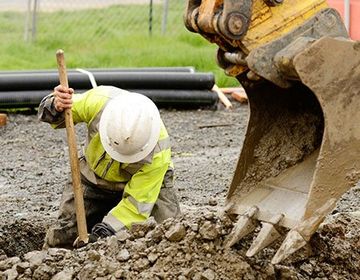Septic Ohio - Comprehensive Septic System Services in Ohio
Septic Ohio - Comprehensive Septic System Services in Ohio
Blog Article
Comprehensive Excavation Methods: Grasping the Fundamentals for Success
The cautious preparation, precise execution, and precise attention to information needed in excavation projects demand a thorough method that includes different essential aspects. The real proficiency exists not merely in understanding these principles however in flawlessly incorporating them to browse the intricacies of excavation tasks with finesse.
Understanding Excavation Task Preparation

The first stage of any type of excavation task is the preparation phase, where critical decisions are made that can dramatically influence the result of the project. Comprehending the task budget plan, range, and timeline constraints is important for producing a detailed excavation plan that makes sure the project's success.
One key aspect of excavation task preparation is the advancement of an in-depth timeline that lays out the series of landmarks, tasks, and due dates. This timeline serves as a roadmap for the job team, enabling them to track development and make required adjustments to make certain the job remains on schedule. In addition, a well-defined budget that makes up all expenses, consisting of devices rental, labor prices, and materials, is vital for staying clear of expense overruns and delays. By carefully taking into consideration all these elements during the drawing board, excavation projects can be implemented effectively and properly, bring about effective end results.
Soil Analysis and Site Assessment
Conducting complete dirt analysis and site analysis is a critical step in the preparation phase of any excavation job. Dirt evaluation entails establishing the composition, framework, and homes of the soil at the excavation site. This info is vital for understanding the soil's bearing capability, wetness material, and capacity for disintegration, which are vital factors in determining the excavation methods and equipment required for the project.
Site evaluation surpasses soil evaluation and encompasses a wider assessment of the overall website problems. This analysis consists of identifying any potential threats, such as below ground energies, environmental worries, or unsteady terrain, that might influence the excavation procedure. By completely examining the site, project supervisors can create reliable excavation methods that prioritize safety and security, efficiency, and environmental management.
Making use of sophisticated innovations like ground-penetrating radar, dirt tasting, and drone surveys can improve the accuracy and performance of soil analysis and site analysis. Investing time and resources in these initial actions can inevitably conserve time and stop costly hold-ups or problems during the excavation procedure.
Devices Selection and Use
Effective excavation projects depend heavily on tactical devices option and application to guarantee optimum performance and performance. Picking the appropriate equipment for the work is important in making best use of effectiveness and reducing downtime. Variables such as the type of dirt, depth of excavation, and job range play a significant duty in figuring out one of the most suitable devices for the task handy.

Along with picking the ideal tools, appropriate utilization is key to project success. Operators must be educated to take care of the tools safely and successfully - lancaster excavation. Normal upkeep checks and timely repair work aid stop malfunctions and make sure constant performance throughout the job
Security Steps and Regulations Conformity
In the realm of excavation jobs, prioritizing precaution and conformity with policies is paramount to ensuring a protected and legitimately audio operational atmosphere. septic ohio Precaution include a variety of practices, including carrying out complete site analyses, carrying out proper signage and obstacles, and offering adequate security training for all employees associated with the excavation procedure. Adherence to policies, such as OSHA needs in the United States, ensures that the excavation job meets the needed standards to secure employees, onlookers, and the surrounding environment.

Tracking Development and Adjusting Techniques
How can predict supervisors efficiently track the innovation of excavation tasks and adjust their techniques accordingly to enhance outcomes? Surveillance progress is essential for making certain that excavation jobs remain on track and fulfill deadlines. Job managers can make use of different devices and techniques to track progression, such as day-to-day progress records, regular website inspections, and progressed monitoring technologies like drones and GPS tracking systems. By continually checking the project's innovation, managers can determine any prospective hold-ups or issues early and take aggressive procedures to resolve them.

Verdict
To conclude, grasping the principles of extensive excavation strategies is important for the success of any type of project. By comprehending task planning, analyzing dirt and website problems, picking appropriate tools, abiding by safety laws, and keeping an eye on progress, task supervisors can ensure a smooth and efficient excavation process. Carrying out these methods will result in effective results and lessen potential risks or troubles throughout the excavation job.
The first phase of any type of excavation task is the planning stage, where important choices are made that can considerably impact the result of the task. Comprehending the task timeline, scope, and budget restrictions is essential for creating an extensive excavation strategy that ensures the task's success.
How can predict managers successfully track the innovation of excavation projects and adjust their techniques appropriately to enhance outcomes? By closely keeping track of progress and being ready to adjust approaches, job managers can improve the general success of excavation projects.
By recognizing task preparation, examining dirt and site conditions, choosing suitable equipment, conforming with security guidelines, and monitoring development, job managers can make sure a reliable and smooth excavation process.
Report this page